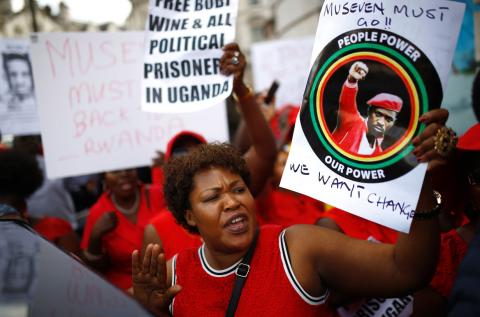Advertisement
'Ghetto President' shakes up Ugandan politics
NAIROBI (Reuters) - The arrest this month of a 35-year-old legislator who calls himself "Ghetto President" has sparked fierce street protests in Uganda. Musician-turned-MP Robert Kyagulanyi represents a new challenge to President Yoweri Museveni, in power since 1986.
Museveni has won praise in the West for his support against militant Islam and his role as power broker in the volatile Great Lakes Region. Uganda has also welcomed foreign investors such as France’s Total, China’s CNOOC and Britain’s Tullow as part of a plan to start pumping oil from 2021.
But the 74-year-old leader's move to sign a law scrapping a 75-year age limit has prompted many Ugandans to believe he wants to remain in power indefinitely.
Opposition to him has been galvanized by Kyagulanyi, who according to his backers was beaten and tortured after he was arrested on Aug. 14 for his role in the stoning of Museveni’s convoy.
He was unable to stand without help when he appeared in a military court last week to face charges, subsequently dropped, of illegal weapons possession. He was then charged with treason in a civilian court before being granted bail.
Though many Ugandans have long complained of worsening government services, rising crime and widespread corruption, there has not been a politician broadly popular enough - especially among the young - to challenge the status quo.
WHO IS "BOBI WINE"?
"Bobi Wine" is the stage name of Kyagulanyi, who entered politics last year with a landslide victory as an independent candidate in a parliamentary by-election. He was already well-known among young Ugandans for his songs about corruption, poor government services and poverty.
"Why de price of electricity too high? Why de price of education is too high?", Kyagulanyi crooned in one song. His music videos frequently portray the life of everyday Ugandans in neighborhoods with unpaved roads and poor infrastructure.
Kyagulanyi has become a leading critic of unpopular measures including a tax on social media used by many Ugandans. Despite having an active Twitter account himself, Museveni says social media is used to spread gossip and lies.
HOW HAS THE GOVERNMENT RESPONDED?
Street protests against government policies have broken out repeatedly in recent years. Rights groups say Museveni has reacted with a mix of force and cash handouts. The government denies the use of heavy-handed tactics and says the country is a thriving multiparty democracy.
Last week, during two days of anti-government demonstrations in the capital Kampala and other parts of the country over Kyagulanyi's detention, police said they arrested dozens of people in Kampala and fired tear gas to quell "riots".
On Tuesday, soldiers involved in the alleged beating of Kyagulanyi, four other MPs and civilians who have been charged with treason, the army said. That came after the Parliament Speaker called for the arrest of security forces involved in the beatings in a letter to Museveni on Aug. 27.
IS HE A THREAT TO MUSEVENI'S GRIP ON POWER?
Nearly 80 percent of Uganda's population of 41 million people is under the age of 30, according to Youth Policy Labs, a Berlin-based think-tank. Though new to politics, Kyagulanyi has succeeded in mobilizing youth discontent. The #FreeBobiWine hashtag has become a rallying point on Twitter.
This is something veteran opposition politicians such as Kizza Besigye, who at 62 years old is considered part of Museveni's generation, have failed to do so. Besigye has lost three consecutive, disputed presidential elections.
The energy behind Kyagulanyi comes in contrast to signs of declining support for Museveni, a former guerrilla fighter and one of Africa's longest-serving rulers. At an Independence Day party in his home region last year, uniformed security outnumbered a small crowd of bored spectators.
For now, the protests have abated. But independent Kampala-based analyst Anna Reuss said the movement around Kyagulanyi still had the potential to be a game-changer.
"What has happened over last two weeks has changed the country and changed the conversation," she said. "It's lit a fire that even if it just keeps smoldering, the government can't fully put it out again."
(Additional reporting by Elias Biryabarema in Kampala; Editing by Mark John)



















Add new comment